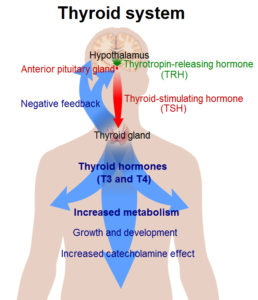Disclosure: This article may contain affiliate links. If you decide to make a purchase, I may make a small commission at no extra cost to you.
The thyroid is an important part of our endocrine system which is located around the windpipe area and affects literally every single cell in our body (including hair follicles), by secreting hormones into the bloodstream. So of course, thyroid problems can cause hair loss.
Thyroid hormones regulate our cell metabolism, so if something goes wrong, then it can have major implications for our overall health, not just our hair.
The two main and most common problems with the thyroid are:
- Hypothyroidism (underactive thyroid gland)
- Hyperthyroidism (overactive thyroid gland)
Hypothyroidism can be a cause of hair loss in men and women
Having an underactive thyroid is more common than having an overactive one. Some people who have an underactive thyroid might not even be aware of this. It might be sub-clinical, so it doesn’t usually interfere with normal life. However, if the condition gets worse, then symptoms will often appear.
What are the causes of hypothyroidism?

There can be a number of reasons for an underactive thyroid. Some can be benign, where levels of T3 and T4 are decreased and TSH remains normal.
Calorie restriction can reduce thyroid hormone levels, but is unrelated to a disease. This is simply the body trying to conserve energy, and once calorie intake is increased, the thyroid gland will respond in turn.
A low thyroid (in the absence of disease) has actually been linked to longevity in animals and humans.
What are the causes of hypothyroidism?
- Infections
- Hashimoto’s disease (autoimmune disease)
- Underdeveloped thyroid gland during child development
- Medications (antivirals, amiodarone, interferons)
One of the signs of hypothyroidism is slower hair growth and hair loss. But there are also other important symptoms that you should look out for.
Symptoms of hypothyroidism
- Hair that becomes dry and brittle
- Diffuse hair loss or patchy hair loss
- Low body temperature
- Weight gain
- Low energy levels and feeling tired all of the time
- Frequent infections
- Cold hands and feet
- Dry skin, eyes, and ears
- Depression
If you have at least three of these symptoms, then it might be a good idea to check with your doctor to get a blood test. Try to look at Free T3, Free T4, and TSH.
Hyperthyroidism can also be a cause of hair loss
This is less common, but can also present a problem for your hair and health when the thyroid is producing too much T3 and T4. This sends the body’s cells into overdrive, causing a host of scary symptoms.
What are the causes of hyperthyroidism?
The main causes of hyperthyroidism include the following:
- Thyroiditis (inflammation of the thyroid gland)
- Excessive iodine intake
- High dose of thyroid hormones (T4)
- Grave’s disease (one of the most likely causes)
Hair loss and hair graying are both signs of someone having an overactive thyroid. However, other symptoms are much more concerning and are likely to be noticed and troubling before you ever start to worry about your hair.
Symptoms of hyperthyroidism
- Rapid heartbeat (tachycardia)
- Hand tremors
- Insomnia
- Palpitations (irregular heartbeat)
- General anxiety and nervous behavior
Will my hair come back when thyroid levels are normal again?
There is a very good chance that once your thyroid levels have been corrected, your hair will return to normal.
Usually, because the hair growth cycle can take months, you should wait at least 3 or 4 months before you start to see any return of the hair. It may even take longer as your body starts to readjust.
Eat well, make sure you’re getting all the vitamins, minerals, fats, and protein that are essential for hair growth, and have a bit of patience.
Hair growth is very sensitive to hormones
Our hair follicles are hypersensitive to sudden changes in hormone levels. The thyroid isn’t the only gland that affects our hair growth.
Hair growth can also be affected by levels of estrogen, testosterone, DHT, IGF-1, and others.
Therefore, it is important to recognize that just solving a thyroid problem, might not be the only thing that needs to be done for optimal and fast hair growth.
In addition to getting your thyroid checked, I recommend speaking to your doctor about getting a comprehensive blood panel such as complete blood count (WBC/RBC), metabolic panel, kidney, liver, glucose, sex hormones (male and female hormones), and Ferritin. IGF-1 and C-reactive protein are also useful information to have.
Important: messing with hormones can be dangerous, so it is always recommended that you never try to treat yourself by self-medicating.







No Comments